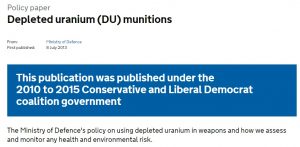The document is ‘an explanation of why the Ministry of Defence (MOD) believe the use of Depleted Uranium (DU) munitions is lawful, why they reject claims that the use of DU munitions presents severe health and environmental risks and why they oppose calls to ban these munitions. The outcome and relevance of the many health and environmental studies which underpin the MOD view, the role of battlefield clearance in further reducing the already low risks from DU contamination and some common misconceptions are described.’
from the MOD policy paper published in July 2013, under a Conservative and Liberal Democrat coalition government.
The Conservative and Liberal Democrat Coalition Government published its policy document on the use of Depleted Uranium weapons on 8 July 2013.
To quote the first paragraph of the report:
‘UK policy is that depleted uranium (DU) munitions can be used in weapons because it would be wrong to deny our armed forces a legitimate and effective capability that can help them achieve their objectives as quickly and safely as possible. Claims of serious health and environmental effects by a very small number of people attract media attention but are disputed by most scientists and international agencies. Whether other countries use DU munitions or not is a matter for them.’
In three sentences, the UK government declares its support for the use of DU weapons, denies the validity of any opposition to their use and absolves the government of any international responsibilities towards their use.

The first sentence causes especial alarm as to the thinking which lies behind the government support. If it would be ‘wrong to deny our armed forces a legitimate and effective capability that can help them achieve their objectives as quickly and safely as possible’, then any armament, any technology, anything that the military decides is necessary for its purposes will be sanctioned. There is no provision for a democratic check on what the military may decide it needs. It cuts the military loose from being held to account for its intentions and its actions in support of those intentions.
The philosopher Elaine Scarry, in Thermonuclear Monarchy. Choosing Between Democracy and Doom, argues that the military, in order to exist, must be able to cause harm to the human body. That is what it must be able to do, or threaten to do in order to function and for that causing of harm to be sanctioned. The nuclear capabilities of the military are of a different order of harm to that of conventional weapons and these capabilities have accrued a different order of functioning in a democracy. The development and deployment of nuclear arms has been taken out of the public realm under the rationales of commercial and defence secrecy. As the decision to deploy fissionable nuclear weapons rests with one person, a head of state, this renders society a ‘monarchy’, rather than a democracy.
Her thesis can be seen to apply to other non-fissionable nuclear weapons, such as those incorporating Depleted Uranium. With this report, the government sets a policy which appears to absolve itself of its democratic responsibilities to question the undertaking of war and the technologies involved, in favour of unconditional support of decisions by the Military in these regards. With this policy, these decisions are taken outside the public realm, handed to a ‘monarchy’ of the Military, decisions which alter public health and environments over an indeterminate time and with unknown effects.
The near-contempt with which the report holds any contrary views, or views from the public, and its appeal to primarily government-funded science to validate the weapons’ safety, has been integral to the justifications for DU weapons from the beginning. This is not to discredit all the science. It is to say that not all the questions regarding the ‘safety’ of DU weapons can be answered by the experiments designed to prove safety according to criteria set by the agencies who have a controlling interest in the development and use of the weapons.


